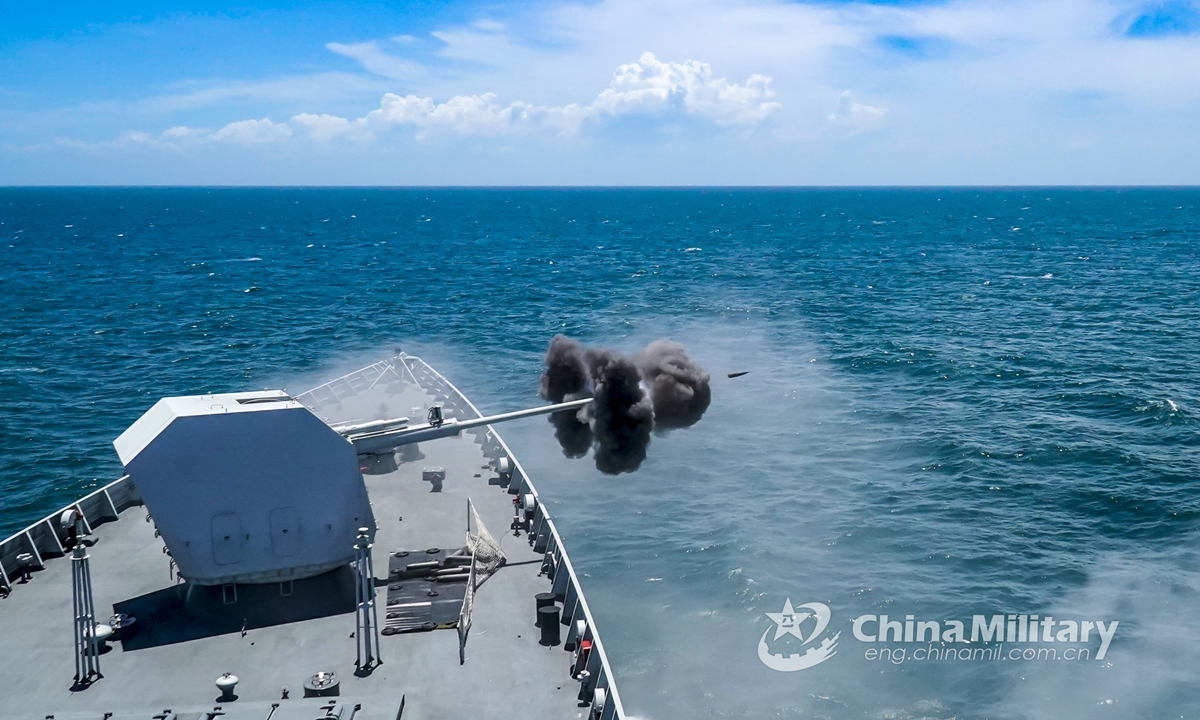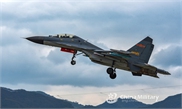
The guided-missile frigate Yulin (Hull 569) attached to a destroyer flotilla with the navy under the PLA Southern Theater Command fires its main-gun against mock ashore targets during a maritime training exercise in waters of the South China Sea in late March, 2020. The guided-missile frigates Xuchang (536) and Yulin (Hull 569) jointly execute maritime tasks on subjects including formation maneuver, live-fire operation, anti-submarine warfare (ASW) operation, joint salvage, etc.Photo:China Military
US warship's constant excursions into the South China Sea may increase the possibility for military skirmishes with China, and shows that the US is using every arrow in its quiver to contain China, military experts said after the US enhanced its presence in South China Sea region and colluded with Australia and the UK to back its moves.
The US will continue the pace of "freedom of navigation operations" in the South China Sea, which hit an all-time high in 2019, US Secretary of Defense Mark Esper said on Tuesday.
US fighters have also entered the area several times since July 13, media reported.
In early July, two US aircraft carrier battle groups which sailed the South China Sea were nothing more than paper tigers on China's doorsteps, as the region is fully within the grasp of People's Liberation Army (PLA) with specially made weapons that can destroy aircraft carrier, said analysts.
Media reports said US Secretary of State Mike Pompeo is scheduled to give a speech Thursday in California about China at a time of escalated tensions between the two countries.
Song Zhongping, a Chinese military expert and commentator, told the Global Times that Pompeo is predicted to announce further ring-fencing moves against China in his speech.
Military expert Du Wenlong said that the US intention is to make, expand and use skirmishes to hype the situation in the South China Sea.
Song noted that the US has used the South China Sea and its military operation within the region to enhance its crackdown on China, and treated China as its prime opponent.
"Washington now is using every arrow in its quiver to crackdown China," said Song, who believes tensions in the South China Sea region are more intense than they were four years after the ruling by the Arbitral Tribunal regarding the South China Sea.
The situation is more complicated and has intensified as US has become tougher as it sees China's "overly exploitation" of the region as damaging its core interest there, and the upcoming presidential election has also add fuel to the fire.
The US is also frequently conducting joint military drills with other countries. Indian Navy warships held a joint exercise with the United States Navy in the Indian Ocean on Monday.
A day after the US House of Representatives slammed China's "aggression against India" in the Galwan Valley, US supercarrier USS Ronald Reagan on Tuesday carried out a joint exercise with two QUAD members — Australia and Japan — in the Philippine Sea.
Those moves suggested that the US is intending to collude with other countries, to contain China, said Song, who predicted Japan, Australia and the UK will become important US "accomplices."
Japan may be harboring concerns, but the UK and Australia will firmly support the US because of issues such like Hong Kong, according to Song.
The People's Liberation Army (PLA) will definitely take equivalent countermeasures against US constant provocations in the region, adding to the possibility of military skirmishes, said Song.
He noted that the US is only looking to provoke before the presidential election, and has no intention to make a military conflict, which is not doing any good for the US election. "At the same time, the PLA will also keep their hair on."
Previous media reports said that India is favorably considering Australia's keen interest to be part of the next edition of the Malabar naval exercise which is scheduled to be held later this year.
Qian Feng, director of the research department of the National Strategy Institute at Tsinghua University in Beijing, told the Global Times that even if Australia were to join drills this year, it does not mean that it has officially become a member of Malabar.
Granting Australia membership needs further observation but if the country becomes a member, it will be an unfavorable turn for China, said Qian.
"Once the US manages to pull India, Japan and Australia to form a quadrilateral accord, its goal of containing China becomes more obvious," said Qian.

